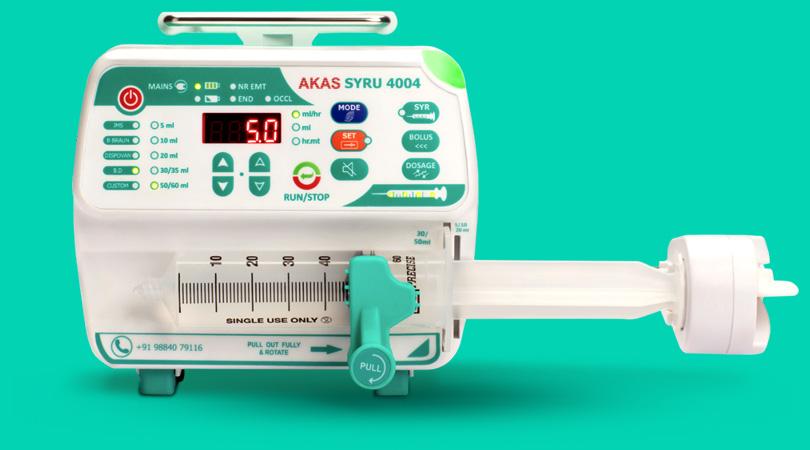Notifications

7 minutes, 3 seconds
-149 Views 0 Comments 0 Likes 0 Reviews

The healthcare sector is witnessing a shift towards smarter, safer, and more precise drug delivery technologies.
In this transition, the syringe pump plays a critical role, evolving from a simple device into a sophisticated tool for clinical excellence.
Hospitals are embracing smart infusion systems that combine digital intelligence with life-saving performance.
Smart syringe pumps are advanced infusion devices equipped with programmable technology.
These systems allow precise, continuous, or intermittent delivery of medication directly into the patient’s bloodstream.
They are widely used in critical care, anaesthesia, oncology, and neonatal units.
Unlike traditional models, smart syringe pumps offer automated safety features.
These include dose error reduction systems, drug libraries, and real-time monitoring of infusion parameters.
The result is a more controlled and safer delivery of high-alert medications.
Accurate dosing is vital in intensive care and surgical procedures.
A syringe pump allows precise control over very small infusion volumes, especially in paediatric and neonatal care.
These pumps ensure that life-saving drugs are delivered at exact rates, avoiding risks of overdose or underdose.
With integrated software and intelligent alerts, smart pumps reduce human error.
They guide clinicians through programming steps and highlight inconsistencies in dosage or drug selection.
This strengthens medication safety protocols and improves overall treatment outcomes.
Smart syringe pumps contribute significantly to improved hospital efficiency.
Their compact design and intuitive interfaces reduce setup time for clinicians.
Multiple pumps can be used simultaneously, managed through centralised systems.
Automated infusion logs make documentation easier and more reliable.
Nurses and technicians can focus more on patient care rather than manual monitoring.
Infusion history is stored digitally, supporting compliance and clinical audits.
Modern syringe pump models are often network-ready, connecting with hospital EMR systems.
This allows real-time tracking of infusions from central workstations or nurse stations.
Critical data such as flow rates, remaining volumes, and alarm history are visible at a glance.
Integration with hospital networks promotes timely intervention and reduces manual checks.
Alerts can be configured to notify staff if there's a blockage, air bubble, or deviation in rate.
Such connectivity enhances patient safety while streamlining hospital workflows.
In oncology, syringe pumps manage chemotherapy agents that require precise titration.
They also support controlled pain management through PCA (Patient-Controlled Analgesia) systems.
Neonatal units rely heavily on syringe pumps for delivering tiny doses of medication with exact timing.
Anaesthesia departments use smart syringe pumps for sedation, analgesia, and muscle relaxation.
The ability to maintain stable drug levels over long surgical procedures is crucial.
These devices offer dependable performance in dynamic and high-pressure environments.
Dose error reduction software to support accurate calculations.
User-friendly interface with colour-coded touchscreens and programmable protocols.
Multi-language support to accommodate global healthcare teams.
Compatibility with a wide range of syringe brands and sizes.
Long battery backup to ensure uninterrupted delivery during power outages.
Lightweight, portable design for flexibility across departments.
Infusion errors can result in serious patient harm or delayed recovery.
Smart syringe pumps are equipped with advanced alarm systems and occlusion detection.
They automatically halt infusion if any deviation is detected from the programmed parameters.
These features help in early detection of issues before they escalate into emergencies.
Such safety mechanisms align with hospital accreditation standards and improve patient outcomes.
Adopting smarter systems is a proactive step toward a culture of safety in medication administration.
Evaluate device accuracy, reliability, and clinical application compatibility.
Look for ease of integration with existing hospital systems and EMRs.
Confirm the availability of service support, technical training, and spare parts.
Check for built-in drug libraries and the ability to update protocols.
Consider whether the pump supports both single and multi-channel operations.
Assess the durability and hygiene-friendly design of the unit for long-term use.
AI-driven infusion control is emerging, enabling real-time dose adjustments.
Machine learning could predict occlusions or dose delivery issues before they occur.
Integration with wearable monitors may allow personalised infusion regimens based on patient vitals.
Mobile apps for clinicians to control and monitor infusions remotely are in development.
Cloud-based data storage and analytics will provide insights into therapy effectiveness.
The future is heading toward more personalised, responsive, and intelligent infusion systems.
Smart syringe pump technology marks a pivotal advancement in hospital care.
These devices bring safety, precision, and connectivity into a single unit.
Hospitals benefit from enhanced outcomes, streamlined workflows, and reduced medication risks.
Choosing the right syringe pump starts with finding a manufacturer that values innovation, compliance, and reliability.
Akas Infusion is known for manufacturing world-class drug delivery devices, including volumetric pumps that support accurate and safe infusion therapy.
By selecting trusted partners like Akasinfusion, hospitals can ensure their infusion systems are future-ready and patient-centred.

